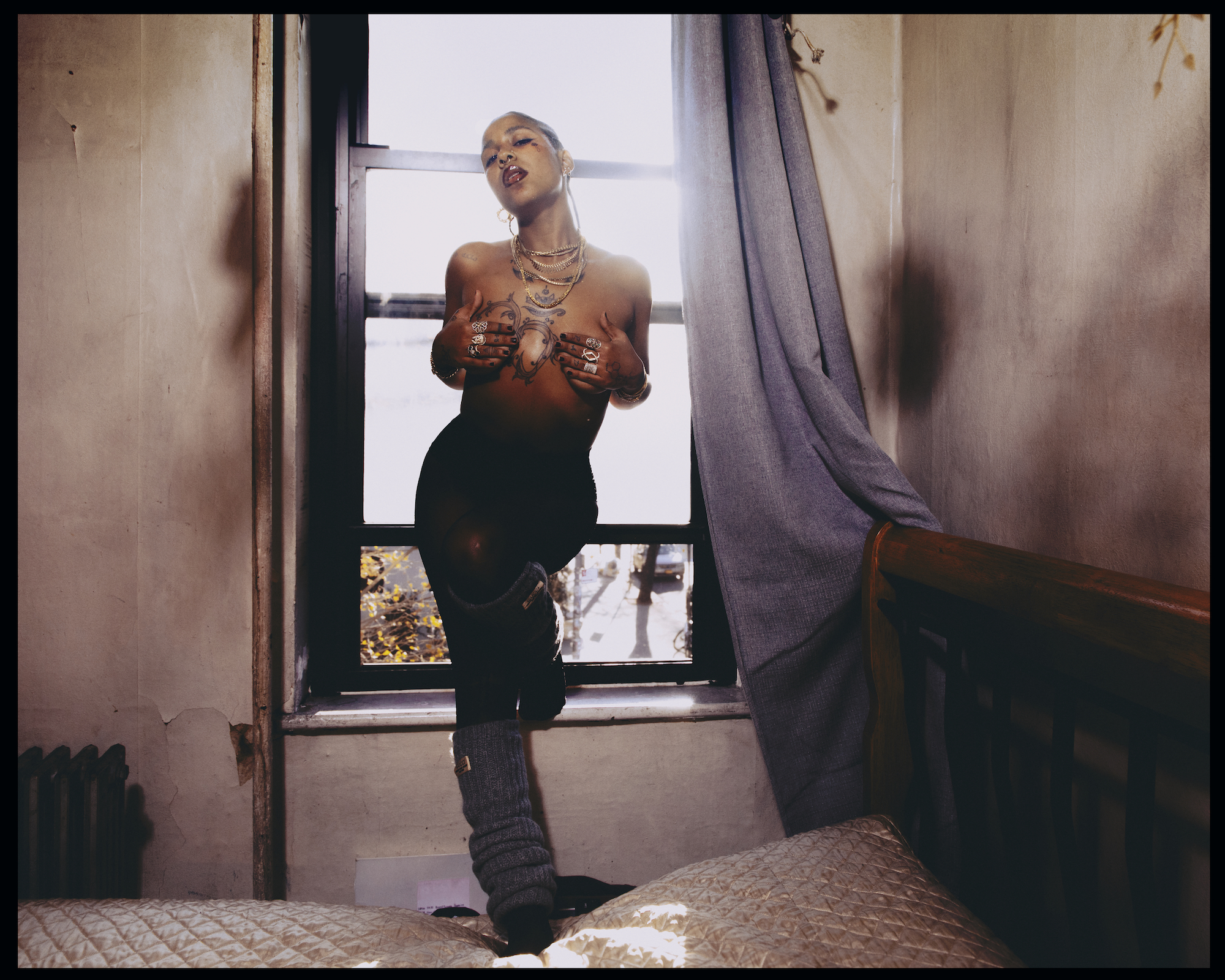Back in March, Tokischa Altagracia Peralta played a set at Musica Club in New York. The inconspicuous venue in Hell’s Kitchen was hosting a party for Dominican Independence Day Weekend. Who better to invite than Quisqueya’s firebrand of the moment? The chaotic set included Tokischa twerking on all fours, running around onstage yelling “popola presidente” — literally, “President Pussy” — and receiving a lechazo to the face straight from a fan’s exposed breasts.
“I saw her again recently when we did a listening party for my new song ‘CANDY’,” Tokischa tells me over Zoom. “She was there, and she was still squirting milk. Can you believe it?”
For Tokischa, it’s another day in the life. The Dominican rapper has been making waves in her local underground since 2018’s “Pícala” with Tivi Gunz. In the years since breaking through the Latin mainstream, she’s become known for her fun and raunchy dembow, including high-profile collaborations with Rosalía, Dominican-Puerto Rican popetón prince Ozuna and most recently, rising rapper Sexyy Red on their new track “Daddy”.
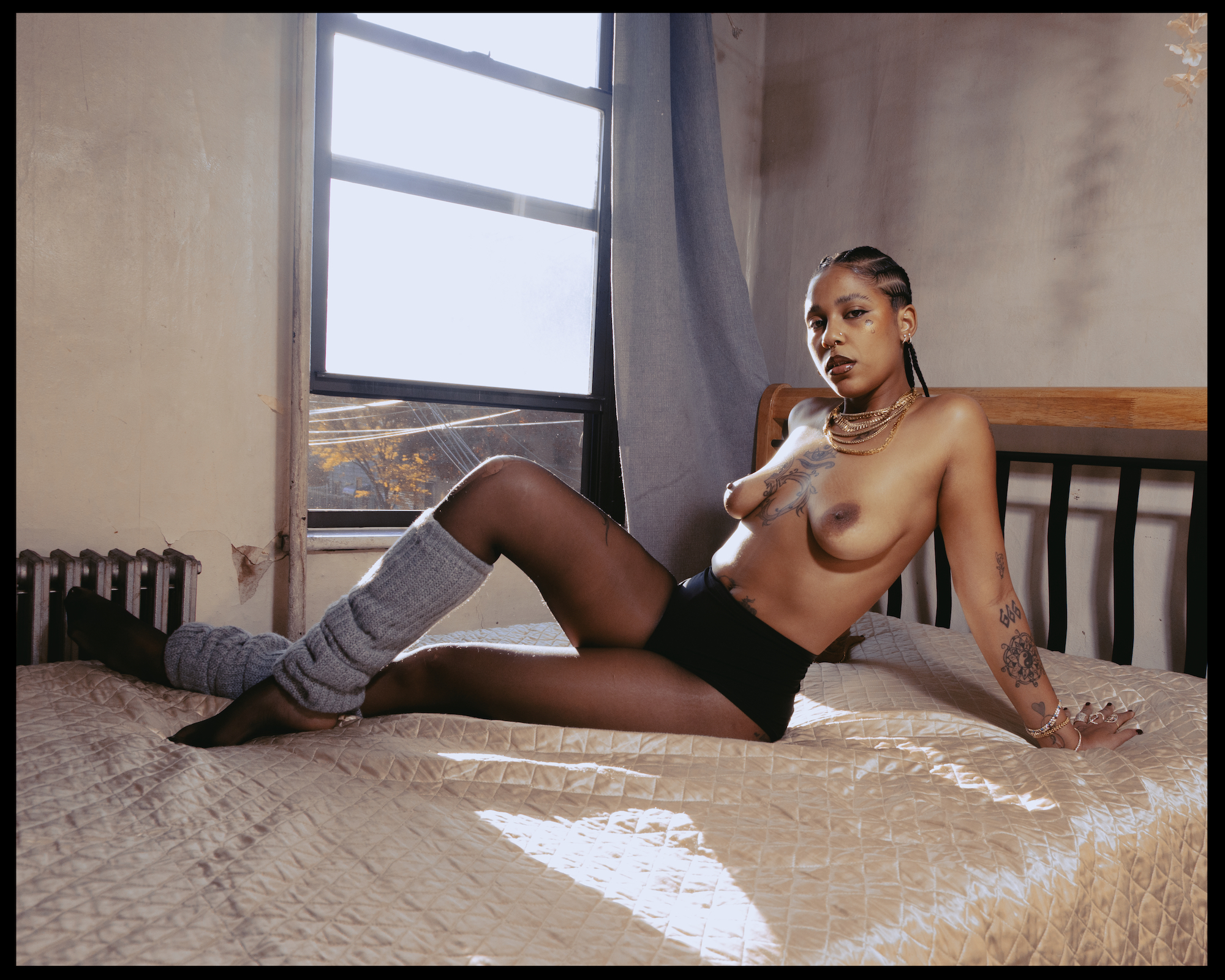
She’s also no stranger to courting controversy. Tokischa’s polarising public persona has landed her in hot water more than once, from paying a fine for provocative photos taken in front of a local religious shrine in the Dominican Republic to widespread condemnation of the visuals for her 2021 collaboration with J. Balvin on “Perra”, which sees the Colombian reggaetonero walking Black women on leashes and Tokischa, herself a proud Afro-Dominican, singing her characteristic, sexually-liberating verses from a doghouse. (All parties involved addressed this, and the video’s director Raymi Paulus told Rolling Stone, “the creative process never aimed to promote racism or misogyny”). As Dominican American music critic Isabelia Herrera once put it, “Tokischa collects scandals like vacation souvenirs.”
This trouble, of course, has also courted her global fanbase. Tokischa is currently in a moment of focus, a marked evolution from her previous devil-may-care attitude toward superstardom. She found herself hunkering down as she became more and more visible: after the dust cleared on the party, suddenly everyone wanted a piece of the 27-year old dembowsera. This even included Madonna, who she collaborated with earlier this year on a remix of “Hung Up” infused with booming pounder riddim, and fellow queer Latinx icons Arca and Villano Antillano, who she was seen hanging out with earlier this year — “la santa trinidad”, (the Holy Trinity) jokes Tokischa of the viral photo.
Tokischa is hyperactive, cartoonishly horny and openly bisexual. Even in this increasingly open time for the culture globally, when the sexual liberation of women and queer people should no longer be a discussion, there’s something subtly revolutionary in the frankness with which the artist flaunts her erotic power. There ares few, if any, mainstream artists in El Movimiento — a catch-all term for reggaeton, dembow and the other genres within the Latin Music umbrella — that could get away with an active, explicit OnlyFans and lyrics about condoms full of leche and getting her ass eaten. The way she tows the line between the explicit and the empowering — and the way she doesn’t give a single fuck about being anyone’s icon — has made her exactly that, especially among young queer Latinxs.
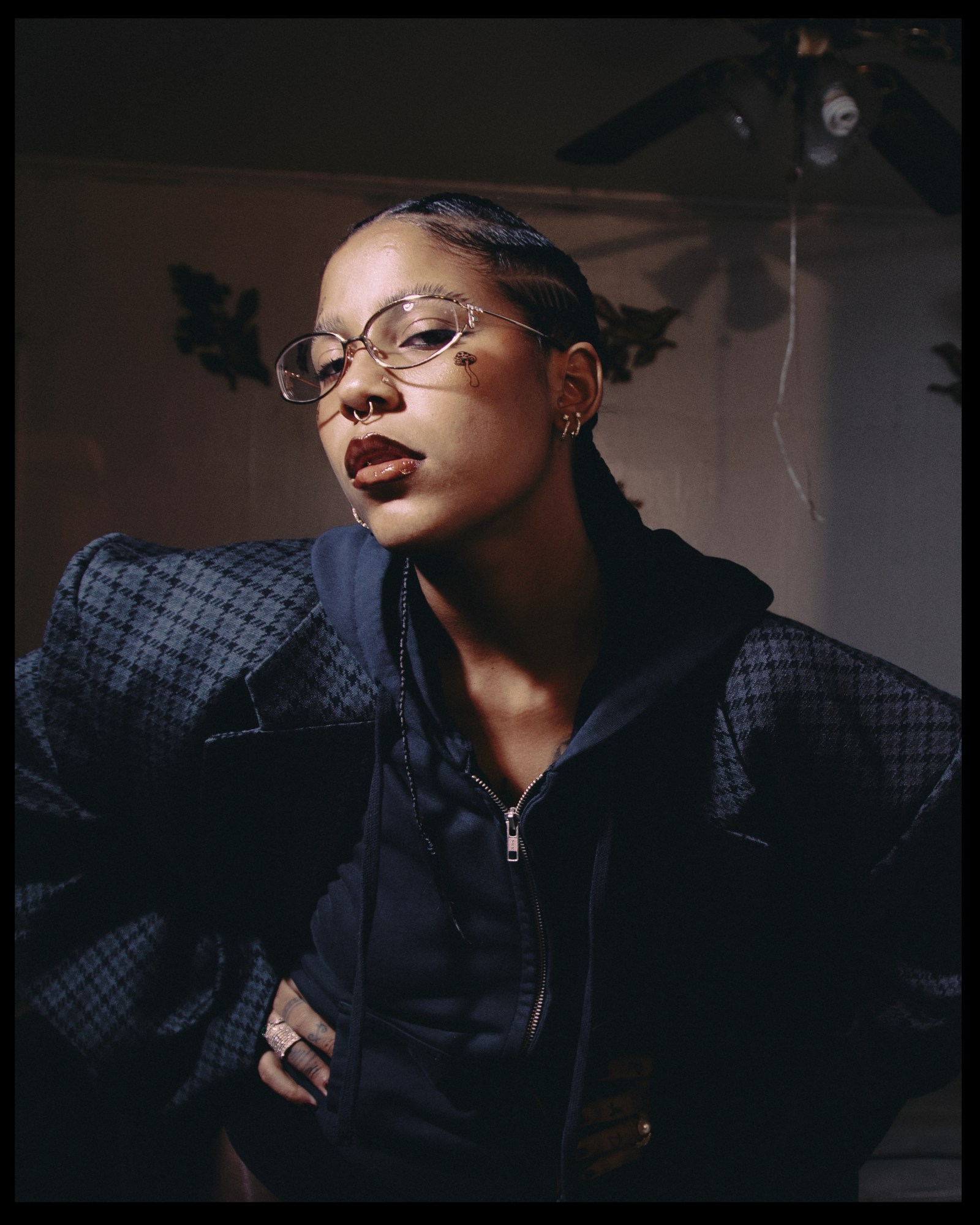
Tokischa has also adopted an empowering new masc persona as of late. As Popola Presidente, she dons a suit and presides over the queers and the outcasts while promoting great sex for all. It’s an energy that calls to mind 2020 release “Varón”, where she slings hard verses about the boss behaviour she could’ve indulged in more freely had she not been born with “a toto”. Her ensuing Popola Presidente Tour took her through Europe, South America and the Caribbean throughout 2023, save for an intimate one-off performance at New York’s Webster Hall last October. The show, announced shortly after she won an award for Best Dembow Collaboration at Premios Juventud, sold-out in 30 minutes. The year before was also spent on the road. Behind closed doors though, as she has continued to promote a party girl persona on stage, Tokischa was grounding herself as she traversed the highs and lows of wild success.
“I was sober for three years — no weed, no alcohol, no consuming any kind of drug,” she says. “Last year I started drinking again, and every once in a while I’ll have a shroom. It’s important to have a mentality of knowing when to stop. It’s an incredible personal power of the mind, and it helps your body, your skin and your soul.”
“[On tour], I learned a lot about vocal preparation, the importance of breath control, connecting with my body,” Tokischa continues. “I also incorporated dancers, and learned about the human element — what it’s like to share that onstage moment with another person and connecting with the public.”
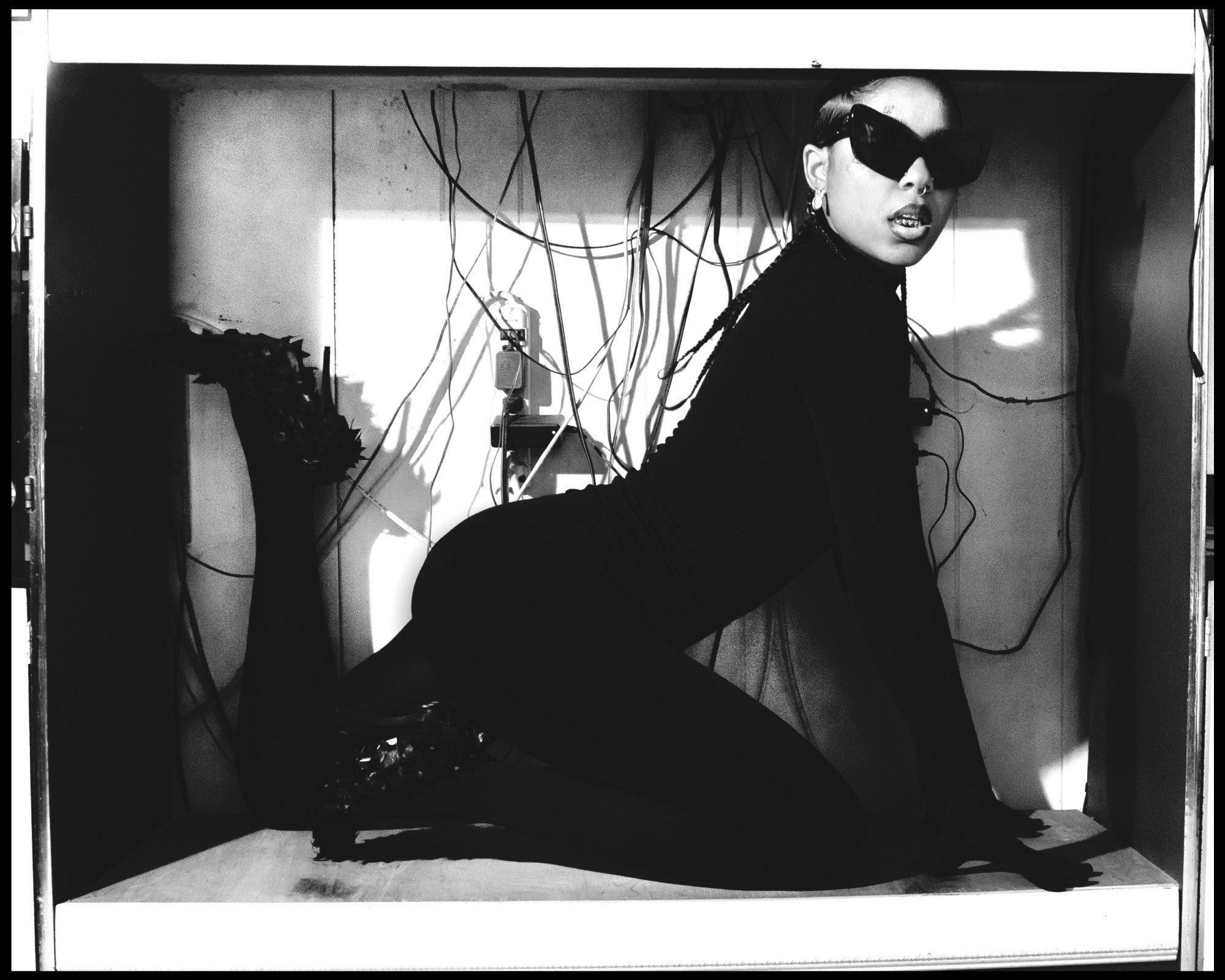
Over the last five years, she’s been releasing a steady stream of singles with no sign of an album forthcoming — “I had to move it, but I will say a very special project is coming, and it’s a gesture toward a full album,” she teases. Regardless, what she has been dropping is pretty compelling. Take the fast-paced Halloween single “CANDY”, for one. What could have been a trite seasonal throwaway or a piggyback off Plan B’s reggaeton classic draws inspiration from a darker place. The song is named after a friend of Tokischa’s and is set at a party where they’re both high out of their minds. “Candy’s crazier than [her] / Because she’s doing coke,” Tokischa spits over a beat spilling over with the speed of a bullet-train. It’s typical fare for her, but she’s breaking new ground by playing with restraint, even if that comes in the form of saying she’s lit but maybe not the most lit at the party.
“This track was originally really soft and slow, a mellow track; then I re-read the lyrics and knew I needed to throw some dembow on it. I still plan on releasing the original at some point,” Tokischa says of the new track. “I come from a world full of drugs, of vice, the street. All my music is about experiences that have marked me. Here, I’m on shrooms, drinking tequila and smoking weed, but my friend Candy is always taking it to another level,” she explains. “This song carries that message of supporting a friend with a drug problem. If I have to tell you to pause and take you to a rehab, I will. It’s easy to become an addict when you’re a creative person looking to have fun. It’s important to take a beat, to have a sober moment.”
The visuals, interspersed with shots of Tokischa wandering around a city, dancing on the back of a van and invading a train with an army of chic alt-kids, are notably cleaner than her past music videos. She even nods at her critics, embodied as a Catholic mother clutching a rosary who chastises her daughter for listening to esa mierda de Tokischa. Meanwhile Tokischa dons a green nun’s habit and a black trench coat with a large cross necklace. She’s become something of a fashion darling, a longtime dream for the girl from bajo mundo, the Dominican hood, whose mother would send her issues of Vogue. Tokischa recently attended the 2023 CFDA Fashion Awards on the arm of Mexican American designer Willy Chavarria. That night, he dressed her and Boricua bad boy Rauw Alejandro in an elegant, rosette-adorned suit and took home Menswear Designer of the Year. She was also the first Dominican artist to sit front row at Louis Vuitton and Tom Ford.
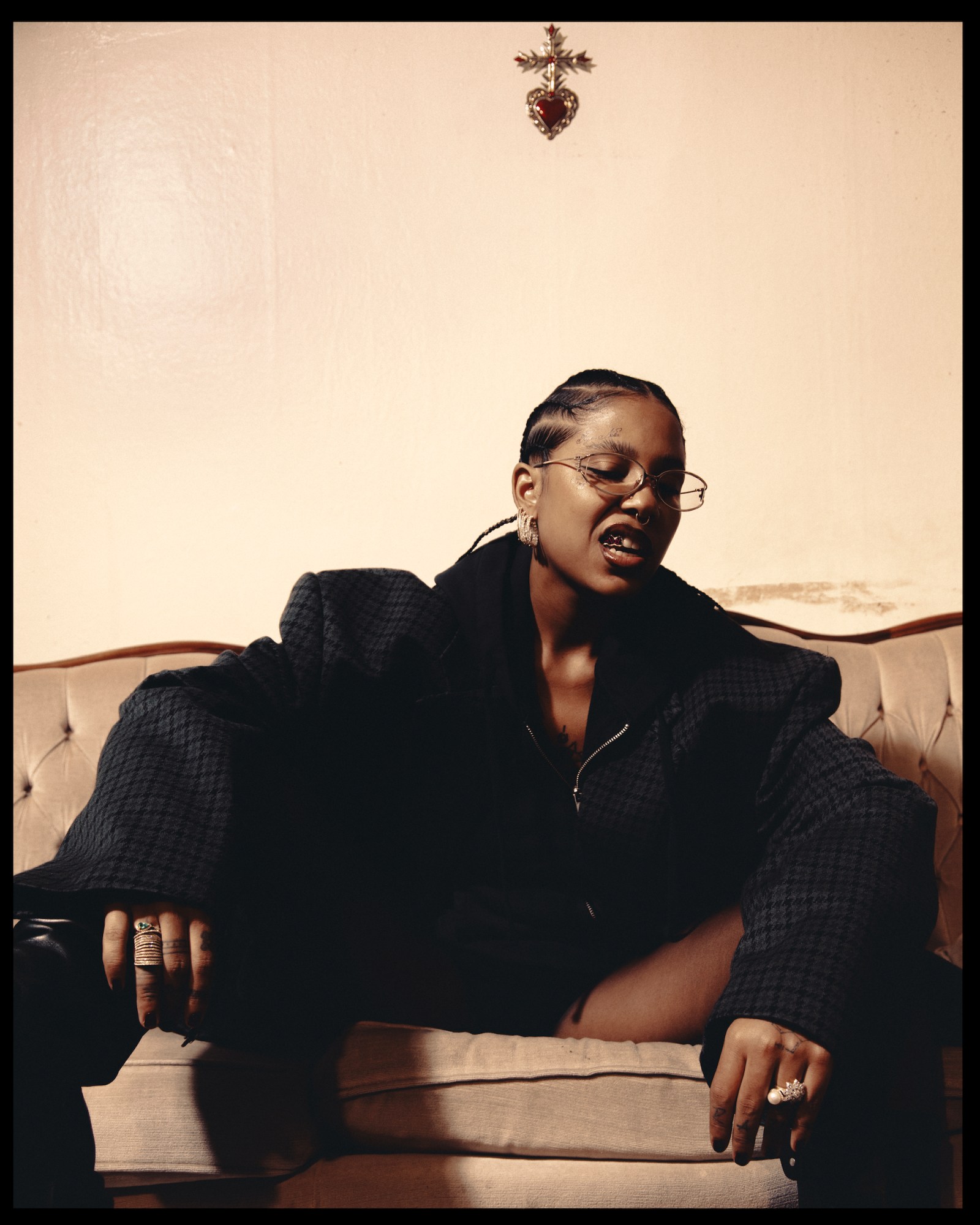
“For me, it’s still so crazy to be in these rooms; I love clothes and the ways that they’re used for artistic expression,” she says of falling in love with fashion. “When I had no money I used to thrift my looks and remodel my wardrobe myself. Now, to be invited by designers to sit at their shows, to go to the CFDA where Rihanna wore the Swarovski dress, and to be with Willy, who won the award. It’s just incredible, and I’m grateful. Where I grew up, you didn’t see that.”
If the “CANDY” video is any indication, Tokischa’s own moodboard indulges the haute couture’s sleeker, darker avant-garde. She’s an avid follower of Balenciaga: “I’m obsessed with their big shoulders and dark aesthetic,” she says. In that same vein, the project she’s giving her energy to right now seems to be taking a page from the current wave of mainstream artists in El Movimiento going “darks”, both musically, and aesthetically, with Tokischa naming Rick Owens as a dream collaborator for her new project. Hinting at it further, she tells me she’s recorded a track with Owens muse and queer goth rave goddess, Arca.
For now, Tokischa’s content focusing on her art. She’s more disciplined than ever and living more like a popstar than a DIY artist from the hood, but she will always be the life of the party — put on one of her songs and dare yourself not to throw it back. “It’s not hard to channel my party side because I lived it,” she says. “I can recreate it in my music, and it feels like a kind of placebo effect for me. It’s not like I stopped — I still go out, but I can spend an entire night and not have one drink because I’m caught up dancing. Balance is important.”
Even if she’s making more waves on red carpets and at fashion shows than the parties of the bajo mundo, make no mistake: Tokischa’s days of popping her popola for the people are not even close to over.
This interview has been translated from Spanish.
Credits
Photography Ashley Peña via Family Artist Management
Styling Caitlyn Martinez
Hair Lisa Torres
Make-up Penelope Sierra
Nails Franny Ventura
